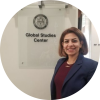Anouar Rahmani is an Algerian novelist, journalist, and human rights defender whose literary work boldly challenges societal norms and advocates for freedom of expression, LGBTQ+ rights, and social justice. Born in 1992, Rahmani has emerged as a fearless and uncompromising voice in Algerian and Arabic literature, using fiction as a powerful tool to confront authoritarianism, religious dogma, and the erasure of marginalized identities.
Since 2019, he has been working on a new novel, continuing his tradition of blending poetic symbolism with sharp political critique. He has published four novels, each igniting critical discourse and controversy, solidifying his status as one of the most influential and daring writers of his generation. Beyond literature, Rahmani has built a distinguished career as an international news editor, journalist, and columnist, with his work featured in renowned media outlets worldwide.
Rahmani is also a literary innovator, blending surrealism, dirty realism, magical realism, dystopian fiction, and allegory to create a distinctive narrative voice. He has established a new school of literature, which he calls "Rebellious Realism"—a style that subverts traditional storytelling by merging poetic symbolism with stark political and social critique, redefining the boundaries of Arabic literature.
As a pioneering advocate for human rights, Rahmani was the first to publicly demand the legalization of same-sex marriage in Algeria, breaking one of the country’s most significant taboos. He is also a prominent figure in the women’s rights movement in Algeria and the broader Arab world, advocating for legal and social reforms to promote gender equality.
In 2018, Rahmani launched a groundbreaking constitutional model initiative for Algeria, the first of its kind, which inspired further constitutional reform movements in the country and directly influenced the drafting of Algeria’s new constitution. He also proposed a new family law model aimed at strengthening women’s rights and equity in Algeria, challenging entrenched patriarchal structures in the legal system.
His work has also played a crucial role in addressing historical injustices. In 2019, Rahmani brought back into public discourse the fate of 20,000 people who disappeared during Algeria’s civil war in the 1990s, a topic long considered a national taboo. Additionally, he was the first writer and journalist to document and highlight the contributions of homosexuals in Algeria’s war of independence, shedding light on a marginalized and erased part of the country’s history.
Rahmani’s commitment to literature and human rights has earned him prestigious international recognition. In 2021, he was shortlisted for the Index on Censorship Freedom of Expression Award and honored by the German Bundestag’s “Parliamentarians for Parliamentarians” initiative for his unwavering dedication to human rights. He is a 2022 Artist Protection Fund Fellow, a City of Asylum Fellow (2022-2025), and his academic journey includes esteemed fellowships such as the Carnegie Mellon Scholars Fellowship (2022-2024) and the Scholars at Risk Fellowship (2023-2024). He is currently a Visiting Faculty at the University of Pittsburgh’s Global Studies Center.
Rahmani holds a Master’s degree in Law, States, and Institutions & International Law from Algeria and a Master’s in Global Communication and Applied Translation from Carnegie Mellon University in Pittsburgh.
Throughout his career, Rahmani has received substantial advocacy support from leading human rights and literary organizations, including PEN International, PEN America, PEN Belgium & Flanders, PEN France, PEN OPP, PEN UK, PEN Canada, Human Rights Watch, Frontline Defenders, the European Parliament, the German Bundestag, numerous African human rights organizations, and other institutions worldwide.
Forced into exile due to threats and repression, Rahmani now resides in the United States, where he continues his literary and advocacy work. His writing is not merely an artistic pursuit—it is an act of resistance, reshaping contemporary Arabic literature and amplifying the voices of silenced communities.
















